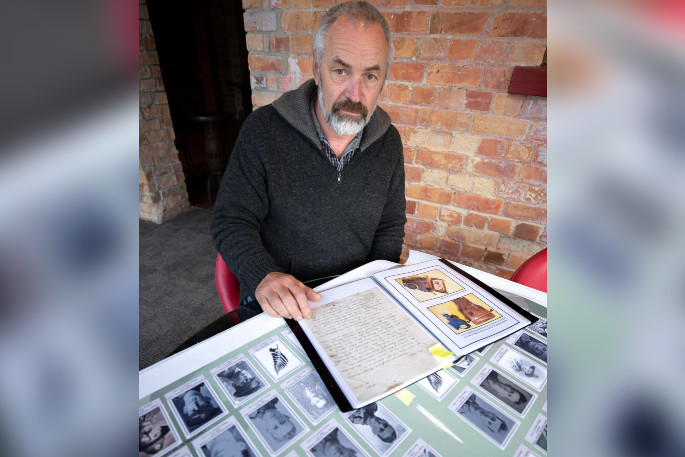A wrong-turn taken at Omanawa by two Israeli tourists back in 2018 may result a five-metre-high, stainless steel, silver fern sculpture erected at a World War I battle site near Tel Aviv in Israel.
Two years ago, The Weekend Sun ran a story about a chance meeting between local developer Warren Dawson and two Israeli tourists, Yossi and Michal Eshed.
The couple had inadvertently discovered Warren's ‘Sarona Park' subdivision in Omanawa Road after taking a wrong turn while looking for a café just out of Tauranga.
The subdivision sign caught their eye because they lived nearby to another ‘Sarona Park' themselves – in their case a suburb of Tel Aviv in present-day Israel.
Yossi and Michal subsequently tracked Warren down, and along with Tauranga author and historian Chris Archer, the four met and began to compare notes.
Thus began an ongoing journey of discovery for Warren and his family.
In 1917, Warren's grandfather Gerald Dawson was part of the combined New Zealand Mounted Rifles Brigade which defeated a larger Ottoman force in the Battle of Ayun Kara.
It occurred on November 14 near a settlement called Sarona in what was then Palestine.
The area clearly made an impression on Gerald who, upon returning to New Zealand, named his Taranaki farm ‘Sarona'.
'I think he liked the land [Sarona in Palestine] so much because it was different to the average towns or buildings of that area,” says Warren.
'That was because it was originally a settlement of immigrants from Germany and so it was built in a different style.
'They were growing citrus and it was quite tropical. I think after that encounter with the Turks it was their first real reprieve after the battle, where they lost quite a few guys.”
Warren subsequently named his Omanawa Road subdivision ‘Sarona Park' in 2006, in homage to his grandfather's Taranaki farm.
It turns out the action at Ayun Kara was a significant one in New Zealand military history.
It was the first time Kiwi soldiers had been led into battle under New Zealand command, Warren says.
Led by Brigadier Bill Meldrum from Wellington, the New Zealanders won the battle that day, but not without the loss of 53 of their number in the process. Around 140 more of the original 800-strong ontingent were injured.
Before meeting Yossi and Chris, Warren didn't know too much about his grandfather.
He says Gerald was a kind and humble man but, like many veterans, chose not to speak about what went on during the war.
One thing that is known however, is that on that November day in 1917 his grandfather was one of five New Zealand soldiers who went out to silence an Ottoman machine gun post.
He's the only one who returned.
Warren and his family are the custodians of various rare WWI memorabilia including some of his grandfather's letters and a field diary.
Notably amongst the items is a German machine gun sight which his grandfather sent home. The accompanying letter said it had been used against the New Zealand soldiers during the action at Ayan Kara.
Since that meeting with Yossi and Michal back in 2018, Warren and wife Robyn have travelled to Israel where they caught up with Yossi and Michal, and visited Ayan Kara along with other battle sites.
Warren was even asked to speak during commemorations for the Battle of Beersheba, which occurred two weeks before Ayan Kara.
In that battle, the New Zealand Mounted Rifles Brigade again played a pivotal role, capturing a strategic fortified hill near the town. It cleared the way for a daring action by the 4th Australian Light Horse Brigade which charged in and caught the Ottoman defenders by surprise.
While the latter engagement has gone done in military lore and is much-celebrated by Australians, Warren says the Kiwi contribution is perhaps less-so-well lauded at home.
It was clear to Warren however, from the Israelis he met during his trip, that they greatly appreciated what the New Zealand soldiers did in WWI and the effort made by them over 100 years ago is still remembered.
The next chapter is that Warren, Chris, and others, now want to erect a lasting monument at the Ayun Kara site to commemorate the Kiwis who fought there.
An obelisk and crosses were erected by surviving soldiers shortly after the battle but due to their wooden construction they deteriorated not long after.
Warren and Chris want to create a replica of the striking five-metre high silver fern sculpture situated at Warren's ‘Sarona Park' in Omanawa and ship it to Israel for placement at the battlefield site.
The Israelis already have a spot planned for it, Warren says.
The group is seeking assistance from others interested in assisting with sponsoring the project - particularly towards transportation.
Chris, who has written a book ‘Saviours of Zion: the Anzac Story from Sinai to Palestine, 1916-1918', says lasting relationships have been formed between Israel and New Zealand as a result of this epic story.
Anyone interested in finding out more about the memorial project can contact Chris, by email at cjwarcher@gmail.com



0 comments
Leave a Comment
You must be logged in to make a comment.